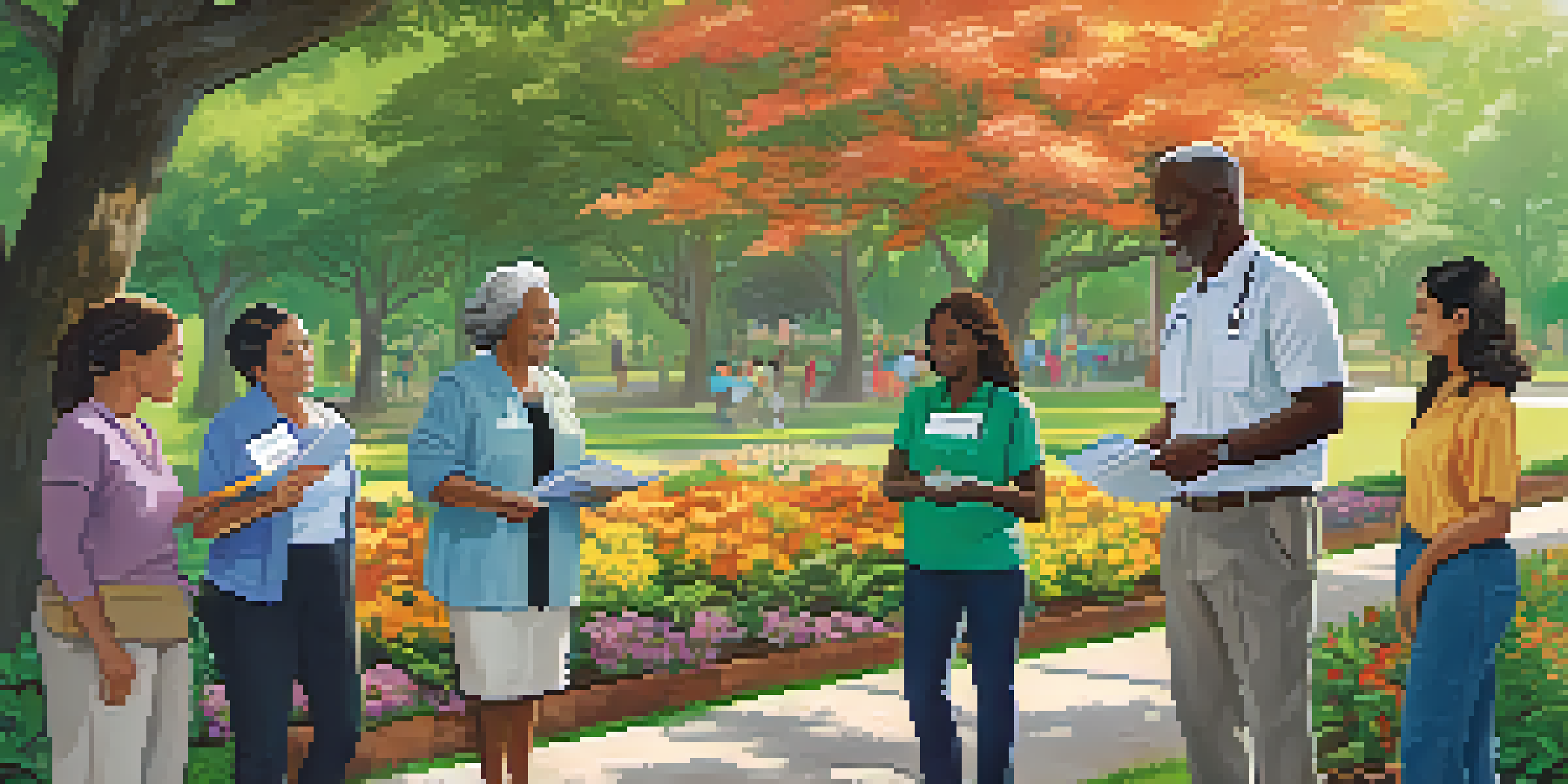The Role of Community Health Workers in Public Health Systems

Understanding Community Health Workers and Their Impact
Community Health Workers (CHWs) are frontline public health advocates who bridge the gap between healthcare systems and the communities they serve. They often come from the communities they work in, which helps build trust and rapport with residents. This unique position allows them to understand local health challenges, cultural practices, and social determinants of health that affect their neighbors.
Community health workers are the backbone of public health, serving as the crucial link between healthcare systems and the communities they serve.
By offering a range of services, such as health education, outreach, and support, CHWs play a significant role in improving health outcomes. They empower individuals with knowledge about disease prevention, nutrition, and available healthcare resources. Their work not only addresses immediate health needs but also contributes to long-term community wellness.
Furthermore, CHWs facilitate access to healthcare services, helping to reduce barriers such as transportation, language, and affordability. They often assist in navigating complex health systems, ensuring that vulnerable populations receive the care they deserve. Their efforts ultimately lead to healthier communities and reduced healthcare disparities.
Key Roles and Responsibilities of Community Health Workers
The roles of Community Health Workers vary widely, but they generally focus on education, advocacy, and support. For instance, they might conduct health screenings, provide information on preventive care, or organize community workshops. By doing so, they help to raise awareness about critical health issues such as diabetes, hypertension, and mental health.

In addition to education, CHWs often play an advocacy role, representing the needs of their communities to local health providers and policymakers. This advocacy can lead to better resource allocation and more responsive healthcare services. They may also engage in efforts to address social determinants of health, such as housing and employment, that impact overall well-being.
CHWs Bridge Healthcare Gaps
Community Health Workers (CHWs) connect healthcare systems with underserved communities, enhancing access and trust.
Moreover, CHWs provide emotional support to individuals facing health challenges. They often establish personal connections that foster a sense of belonging and community. This holistic approach not only improves individual health outcomes but also strengthens community ties.
The Importance of Training and Support for CHWs
While Community Health Workers are invaluable, their effectiveness relies heavily on proper training and ongoing support. Training programs should cover essential topics such as health education, communication skills, and cultural competency. This equips CHWs with the knowledge and tools needed to navigate complex health issues and community dynamics.
The most effective way to improve health outcomes is to engage and empower individuals through trusted community representatives.
Ongoing support from health organizations is equally crucial. Regular check-ins, mentorship, and access to resources can help CHWs stay motivated and informed about the latest health trends. This support fosters a sense of community among CHWs, enhancing their capacity to collaborate and share best practices.
Investing in the training and support of CHWs not only benefits the workers themselves but also the communities they serve. When CHWs feel valued and empowered, they can more effectively address health disparities and improve access to care. Ultimately, this investment leads to healthier populations and stronger public health systems.
Community Engagement: Building Trust Through Relationships
One of the most significant contributions of Community Health Workers is their ability to foster trust within the communities they serve. By being locals themselves, CHWs understand community histories, values, and norms. This familiarity allows them to connect with residents on a personal level, making it easier to discuss sensitive health issues.
Trust is a crucial component in public health, as it influences individuals’ willingness to seek care and follow health recommendations. CHWs work tirelessly to build relationships that encourage open dialogue about health concerns. They often act as liaisons, translating complex medical information into relatable, everyday language.
Training Empowers Effective CHWs
Proper training and ongoing support for CHWs are crucial for their effectiveness in addressing health disparities.
Through these relationships, CHWs can identify and address barriers to healthcare access, such as stigma or misinformation. They also empower community members by encouraging active participation in their own health journeys. This engagement not only enhances individual well-being but also strengthens the overall health of the community.
The Role of CHWs in Addressing Health Disparities
Community Health Workers play a pivotal role in tackling health disparities that affect marginalized populations. By focusing their efforts on underserved areas, they help to ensure that everyone has access to essential health services. This is particularly important in communities where systemic barriers have historically led to poorer health outcomes.
For example, CHWs often provide culturally tailored health education that resonates with their communities. This targeted approach increases the likelihood that individuals will engage with health resources and adopt healthier behaviors. By addressing specific cultural needs and preferences, CHWs can effectively bridge the gap between traditional healthcare and community practices.
Moreover, CHWs advocate for policy changes that benefit their communities, such as increased funding for local health initiatives. Their grassroots efforts can lead to lasting improvements in health equity. By addressing the root causes of health disparities, CHWs contribute to the creation of a healthier society for all.
Success Stories: CHWs Making a Difference
Numerous success stories highlight the impactful work of Community Health Workers across various communities. For instance, in a recent program aimed at reducing infant mortality rates, CHWs provided prenatal education and support to expectant mothers. As a result, the community saw a significant decline in infant deaths, showcasing the power of targeted intervention.
Another inspiring example comes from a CHW initiative focused on chronic disease management. By organizing regular health screenings and education sessions, CHWs helped individuals better manage conditions like diabetes and hypertension. Participants reported improved health outcomes and a greater understanding of their health, illustrating the positive ripple effects of CHW involvement.
CHWs Foster Community Trust
By building personal relationships, CHWs encourage open dialogue about health issues, empowering community members.
These success stories not only demonstrate the effectiveness of CHWs but also serve as motivation for communities to invest in similar programs. As awareness of their contributions grows, more individuals and organizations recognize the value of integrating CHWs into public health strategies. This momentum can lead to even greater advancements in community health.
The Future of Community Health Workers in Public Health Systems
As public health systems evolve, the role of Community Health Workers is becoming increasingly vital. With a growing focus on preventive care and social determinants of health, CHWs are uniquely positioned to address these challenges. Their community-based approach aligns well with the shift toward personalized, patient-centered care.
Looking ahead, there is potential for expanding the scope of CHWs to include more specialized training in areas such as mental health and chronic disease management. This could enhance their ability to serve diverse populations and tackle complex health issues. By embracing this evolution, public health systems can create a more comprehensive framework for community health.

Additionally, increased recognition of CHWs at policy and funding levels can lead to greater resources being allocated for training and support. As more communities witness the benefits of CHWs, there is potential for widespread adoption of their model. Ultimately, the future of community health lies in empowering these essential workers to continue making a difference.